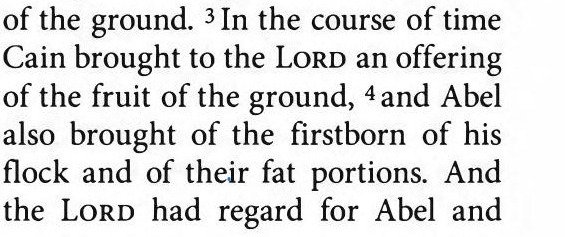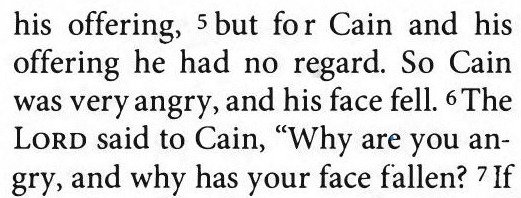The language of ivrit ( עברית ) Genesis 4, DTube Video #2
Welcome to my DTube Hebrew reading & language series.
The full study is now on line covering the Alef-Beyt here in my blog. This is a beginners program to teach letters, vowels, and reading. The vowels are marked in this bible and are designed to help avoid confusion on what a word is and how it is pronounced. The confusion is obvious in the hundreds of interpretations globally.
Today we are continuing in Genesis 4:4-6
The first three verses brought the boys from conception, through childhood and into their professions. We continue on as Abel's sheep was looked upon with regard by Elohim.
Then the offering of Cain was not looked upon with regard, which made Cain "very hot" and his "his face, they fell."
It is interesting that his face is plural (they). It is common in Hebrew for anger to be expressed as one's face or nose getting hot. I am not sure why one offering was seen as good and another as not...
We leave it at this point because I do not want to present the main point before it is read. I usually limit my readings to one screen full of Hebrew, which is plenty when learning to read.
There are a few words that may be new to you:
Gam = Also
Meod = Very
Lamah = Why
Pnav = His face
Fneycha = Your face
Note that the the letter Pey with a dot in the middle is pronounced as "P" and without, like "F". See his face and your face above.
Here is the English to compare. When there are three male persons speaking it is hard to find the right word order in your mind.


It sometimes helps to see the interpretation thought out in English.
Today's reading


This is one of the best ways to learn a language, reading and learning to understand words and word order in Hebrew while reading. Click the links below to hear the reading.
Here are the links
Please click over to DTube and read the above passage with me in Hebrew.
▶️ DTube
▶️ IPFS
Note: my pronunciation of The Name as Yehovah is explained more fully in Genesis 2, DTube Video #2 and the coinciding audio is linked here.
If you are just starting, my lessons are all here starting at Alef, adding vowels (the dots and lines) as we go, the sofit formations and numerical values. Just go to my blog and scroll to the bottom or click here
Get your Hebrew Bible now!
Click here to obtain the book we are using. It is a free download - or browser usable.
Thanks for taking the time to watch and read.

@hebrew,
I didn't yet watch the video! I see you shared few words yeah they are new to me! Great to see this weekly article and the way you write it made things very interesting! Thank you and have a great week ahead!
Shabbat Shalom~
This may be a very basic question, but I don't know, so I'll ask. In the preceding image, why is it that the word is translated Yahweh if it's pronounced Yahovah (Jehovah)? I've seen both in Bibles, but are they different?
You mentioned that you didn't know why one of the offerings was accepted and another wasn't. Hopefully you weren't leaving your explanation for next week with the continuation of the passage. If so, don't read my thoughts here! :)
When it talks about Cain's offering, it says he brought an offering from the fruit of the ground. There are no qualifiers or descriptors on it. however, when it talks about Abel's offering, it says he brought from the firstborn of his flock, and that he brought from the fat of them. It sounds like Abel really brought the best of what he had, whereas (I as an English speaker would infer from the lack of adjectives that) Cain brought offerings that weren't the best of what he had.
God often doesn't look at what we do, but at why we do it. Later, when looking for someone to anoint king of Israel, God tells Samuel that "man looks at the outward appearance, but the Lord looks at the heart." We can possibly surmise that God saw that Abel strongly desired to honor God, and that he trusted God, but Cain was giving the offering as a technicality. I'm not sure, but that's my feeling.
What are your thoughts? Or is that something that you'll look at more this coming week?
Each time it becomes more interesting and more clear. Thank you for another good lesson.
@hebrew I liked the lesson interesting and more understandable. Thanks for the clarification
Awesome Dtube! Very pleasant use of media and teaching techniques. Thank you, sir.
@hebrew
Thanks for the Hebrew this post very important lesson and useful.
your good work and great work
That is Great lesson of Hebrew language.thanks for sharing. very useful lesson information. very good this article.

100% like and resteem
3 tres dias de ferias en mi pueblo y me pierdo las clases online, pero siempre están aquí esperándome jeje
Lamah nos nutres con tu información ?
Gam estamos agradecidos contigo por ello
Tus clases geniales no tienen rival me gustan mucho nos nos abandones gracias a ti ya conocemos muchas palabras en hebreo mas yo me concentro en solo palabras gracias por compartirla
Saludos desde mi terruño venezolano ❤✋
Great teachings from you sir,nice to see this bible lessons sir,online classes have already created great impact on me.
Your classes are always amazing sir,the way you explain in detail is a special skill from you,thanks a lot @hebrew.